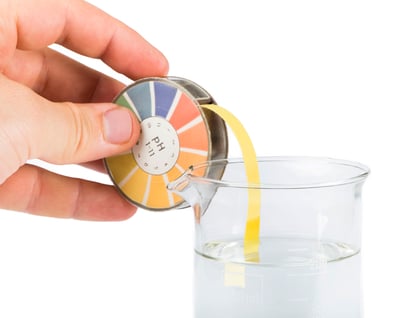We all know it’s essential to stay hydrated in the summer, and that the best way to do so is by drinking plenty of water. But is there a certain type of water, such as “alkaline” water, that offers better hydration? Here’s what our Registered Dietitian has to say.
 Alkaline vs. Acid
Alkaline vs. Acid
Alkaline water is typically fortified with small amounts of “alkalizing” minerals such as calcium, magnesium, potassium, and/or sodium in order to increase its pH, making it less acidic. The pH scale is used to specify the acidity or basicity (alkalinity) of a water-based solution. The pH scale ranges from 0, highly acidic, to 14, highly basic. For perspective, some everyday liquids and their respective pHs include
- battery acid (pH = 0)
- tomato juice (pH = 4)
- baking soda (pH = 9)
- bleach (pH = 13)
Pure water has a pH of 7, alkaline water typically has a pH of 8 or 9.
The Hypothesis
Some individuals hypothesize that drinking water with a higher pH than that of the body’s blood (between 7.35 and 7.45 for healthy individuals) can help decrease acidity in the body by raising its overall pH. However, the pH of the body is tightly regulated by our kidneys and lungs, and excessive acid buildup is unlikely, unless an underlying health condition is present, such as kidney or respiratory failure, severe infection, uncontrolled diabetes, or physical muscle trauma. Even in cases such as these, a lot more would need to be done than drinking water with a slightly higher pH than that of the body. With a pH of closer to 2–3, stomach acid likely neutralizes the water immediately, regardless of how high its pH is. And even if the extra “alkaline” in alkaline water was able to make it into our bloodstream, it would quickly be filtered by our kidneys and removed from the body by way of our urine.
Is It Safe?
Overall, alkaline water is still water; therefore, it is generally safe for consumption and serves its main purpose: to hydrate you. However, any out-of-the-ordinary health benefits boasted on the label are likely just a marketing tactic. Nevertheless, alkaline water is a great choice for hydration, especially when compared to sugary, high-calorie beverages such as soda, sugary sports drinks, and/or juice. Be sure to stay hydrated this summer by drinking plenty of water—alkaline or not!
This blog was written by Lindsey Recker, MS, RD, NIFS Registered Dietitian. To learn more about the NIFS bloggers, click here.



